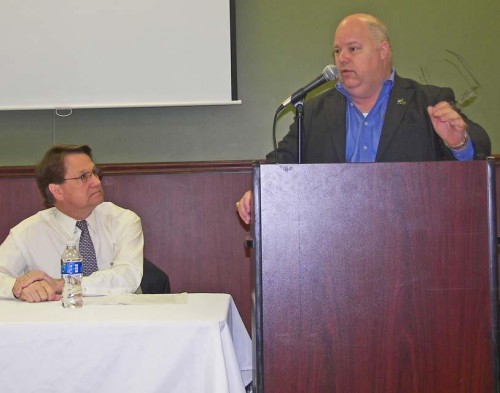
First-year docs learning on the front line at Chabert
April 22, 2009Beulah Bergeron
April 24, 2009Pending a decision by the federal government on whether to allow more foreign sugar into the country, local sugar producers and growers say they are concerned that approval might push sugar prices below the break-even point.
About 50 area sugar producers and growers aired their concerns last Wednesday during a Farm Day forum in Thibodaux that was sponsored by U.S. Rep. Charlie Melancon (D-Napoleonville).
The 3rd District representative said the forum’s intent is to have experts and policymakers meet with those south Louisiana farmers and ranchers who are most affected by agricultural policy.
“Farmers and ranchers in south Louisiana no doubt have questions about developments in Washington that could impact their livelihood, especially with regards to last year’s renewal of the Farm Bill,” he said. “Not to mention, the upcoming trade agreements.”
Melancon said the last time the area held a Farm Day was prior to the passage of the Farm Bill.
On hand as guest speakers for Wednesday’s event were Louisiana Department of Agriculture and Forestry Commissioner Mike Strain and Barbara Fesco, a dairy and sweetener economist for the U.S. Department of Agriculture.
Strain told the local farmers and ranchers that the state’s acreage in agriculture is below level. Statistics show that wheat is down 50 percent, followed by cotton and soybeans at 20 and 17 percent respectively. One of the smaller below level percentages is corn at two percent. Some good news for farmers is rice is coming up a little and sugar is stable as far as total amount of acreage.

“All this year it’s going to be tight,” he said. “We are going to listen to what’s going on with the budget and work through the state budget.”
However, the bigger picture for local farmers and ranchers is the renewed farm bill that gives the U.S. Department of Agriculture the authority, starting this month, to raise sugar import quotas beyond the 1.3 million tons it had already planned to allow.
Food manufacturers, American refineries and foreign countries whose sugar exports are critical to their economic health are pushing the USDA to allow more imports. Mexico, especially, is considering boosting exports as a declining peso makes it more profitable to sell the sweetener in the U.S.
Most of those interests stand to make more money by bringing in cheaper foreign sugar to the U.S., but sugar processors like Lonnie Champagne of Louisiana Sugar Cane Products say they will be hurt by the deal.
Louisiana farmers and processors said Wednesday that a current excess of sugar on the U.S. market means they can’t find buyers for their stocks. Wholesale prices of about 20 cents a pound are so low they can’t make a profit.
“It’s a basic unfairness about all this,” said Michael Daigle, chief executive officer of Paincourtville-based Lula-Westfield. “That’s the wild card in our business.”
Lula-Westfield is a sugarcane-processing plant.
Louisiana’s sugarcane growers have had a tough time over the past few years, as hurricanes and other factors have diminished crops and profits.
“Right now, it’s pretty bad,” Melancon said. “The question is: Are we going to be able to get a correction? Both countries have problems.”
Fesco told local farmers and ranchers that Mexico lacks a program like that of the U.S. She said that is one reason growers are unloading their sugar as quickly and cheaply as they can. Otherwise, they face the prospect of making nothing.
“It could leave those growers with a sharp shortage later in the season, which means Mexico could import foreign sugar from other countries and then sell it along to the U.S,” Fesco said.
Jim Simone, president of the American Sugarcane League, said they’re doing their best to even out all of these imbalances, either through direct negotiations with Mexican growers or a trade mission to help regulate supplies more smoothly.
But that can be a difficult process when some say Mexico’s records of supplies are unreliable and their officials sometimes don’t follow through on the obligations of agreements, Simone said.
U.S. Rep. Charlie Melancon (D-Napoleonville) listens as state Department of Agriculture and Forestry Commissioner Mike Strain addresses the crowd of about 50 area sugar producers and growers at last Wednesday’s Farm Day forum in Thibodaux. * Photo by SOPHIA RUFFIN









